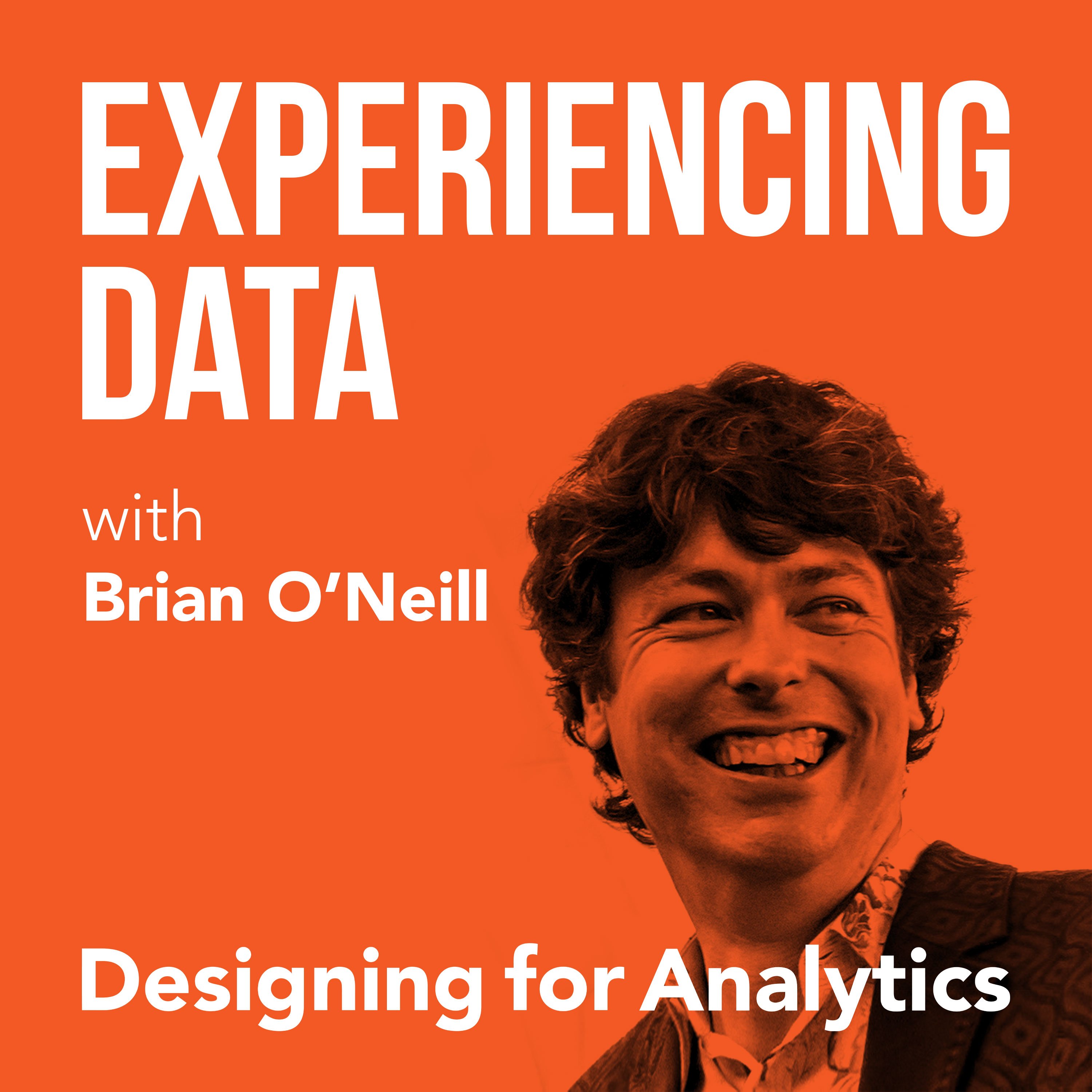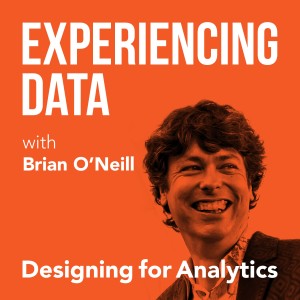

145.1K
Downloads
177
Episodes
Is the value of your enterprise analytics SAAS or AI product not obvious through it’s UI/UX? Got the data and ML models right...but user adoption of your dashboards and UI isn’t what you hoped it would be? While it is easier than ever to create AI and analytics solutions from a technology perspective, do you find as a founder or product leader that getting users to use and buyers to buy seems harder than it should be? If you lead an internal enterprise data team, have you heard that a ”data product” approach can help—but you’re concerned it’s all hype? My name is Brian T. O’Neill, and on Experiencing Data—one of the top 2% of podcasts in the world—I share the stories of leaders who are leveraging product and UX design to make SAAS analytics, AI applications, and internal data products indispensable to their customers. After all, you can’t create business value with data if the humans in the loop can’t or won’t use your solutions. Every 2 weeks, I release interviews with experts and impressive people I’ve met who are doing interesting work at the intersection of enterprise software product management, UX design, AI and analytics—work that you need to hear about and from whom I hope you can borrow strategies. I also occasionally record solo episodes on applying UI/UX design strategies to data products—so you and your team can unlock financial value by making your users’ and customers’ lives better. Hashtag: #ExperiencingData. JOIN MY INSIGHTS LIST FOR 1-PAGE EPISODE SUMMARIES, TRANSCRIPTS, AND FREE UX STRATEGY TIPS https://designingforanalytics.com/ed ABOUT THE HOST, BRIAN T. O’NEILL: https://designingforanalytics.com/bio/
Episodes

Tuesday Jun 27, 2023
Tuesday Jun 27, 2023
Today I’m continuing my conversation with Nadiem von Heydebrand, CEO of Mindfuel. In the conclusion of this special 2-part episode, Nadiem and I discuss the role of a Data Product Manager in depth. Nadiem reveals which fields data product managers are currently coming from, and how a new data product manager with a non-technical background can set themselves up for success in this new role. He also walks through his portfolio approach to data product management, and how to prioritize use cases when taking on a data product management role. Toward the end, Nadiem also shares personal examples of how he’s employed these strategies, why he feels it’s so important for engineers to be able to see and understand the impact of their work, and best practices around developing a data product team.
Highlights / Skip to:
- Brian introduces Nadiem and gives context for why the conversation with Nadiem led to a two-part episode (00:35)
- Nadiem summarizes his thoughts on data product management and adds context on which fields he sees data product managers currently coming from (01:46)
- Nadiem’s take on whether job listings for data product manager roles still have too many technical requirements (04:27)
- Why some non-technical people fail when they transition to a data product manager role and the ways Nadiem feels they can bolster their chances of success (07:09)
- Brian and Nadiem talk about their views on functional data product team models and the process for developing a data product as a team (10:11)
- When Nadiem feels it makes sense to hire a data product manager and adopt a portfolio view of your data products (16:22)
- Nadiem’s view on how to prioritize projects as a new data product manager (19:48)
- Nadiem shares a story of when he took on an interim role as a head of data and how he employed the portfolio strategies he recommends (24:54)
- How Nadiem evaluates perceived usability of a data product when picking use cases (27:28)
- Nadiem explains why understanding go-to-market strategy is so critical as a data product manager (30:00)
- Brian and Nadiem discuss the importance of today’s engineering teams understanding the value and impact of their work (32:09)
- How Nadiem and his team came up with the idea to develop a SaaS product for data product managers (34:40)
Quotes from Today’s Episode
- “So, data product management [...] is a combination of different capabilities [...] [including] product management, design, data science, and machine learning. We covered this in viability, desirability, feasibility, and datability. So, these are four dimensions [that] you combine [...] together to become a data product manager.” — Nadiem von Heydebrand (02:34)
- “There is no education for data product management today, there’s no university degree. ... So, there’s nobody out there—from my perspective—who really has all the four dimensions from day one. It’s more like an evolution: you’re coming from one of the [parallel business] domains or from one of the [parallel business] fields and then you extend your skill set over time.” — Nadiem von Heydebrand (03:04)
- “If a product manager has very good communication skills and is able to break down the needs in a proper way or in a good understandable way to its tech lead, or its engineering lead or data science lead, then I think it works out super well. If this bridge is missing, then it becomes a little bit tricky because then the distance between the product manager and the development team is too far.” – Nadiem von Heydebrand (09:10)
- “I think every data leader out there has an Excel spreadsheet or a list of prioritized use cases or the most relevant use cases for the business strategy… You can think about this list as a portfolio. You know, some of these use cases are super valuable; some of these use cases maybe will not work out, and you have to identify those which are bringing real return on investment when you put effort in there.” – Nadiem von Heydebrand (19:01)
- “I’m not a magician for data product management. I just focused on a very strategic view on my portfolio and tried to identify those cases and those data products where I can believe I can easily develop them, I have a high degree of adoption with my lines of business, and I can truly measure the added revenue and the impact.” – Nadiem von Heydebrand (26:31)
- “As a true data product manager, from my point of view, you are someone who is empathetic for the lines of businesses, to understand what their underlying needs and what the problems are. At the same time, you are a business person. You try to optimize the portfolio for your own needs, because you have business goals coming from your leadership team, from your head of data, or even from the person above, the CTO, CIO, even CEO. So, you want to make sure that your value contribution is always transparent, and visible, measurable, tangible.” – Nadiem von Heydebrand (29:20)
- “If we look into classical product management, I mean, the product manager has to understand how to market and how to go to the market. And it’s this exactly the same situation with data product managers within your organization. You are as successful as your product performs in the market. This is how you measure yourself as a data product manager. This is how you define success for yourself.” – Nadiem von Heydebrand (30:58)
Links
- Mindfuel: https://mindfuel.ai/
- LinkedIn: https://www.linkedin.com/in/nadiemvh/
- Delight Software - the SAAS tool for data product managers to manage their portfolio of data products: https://delight.mindfuel.ai
No comments yet. Be the first to say something!